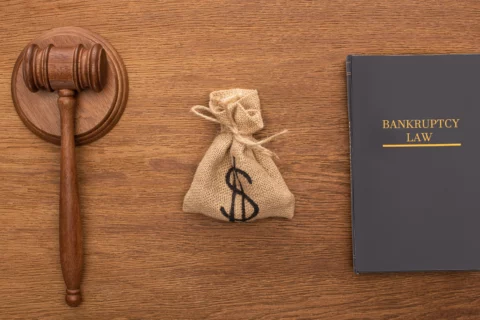What Happens When You File For Bankruptcy in Illinois?
Wipe Out Your Debts Today!
If you are among the numerous individuals wondering what happens when you file bankruptcy in Illinois, that’s normal. Like any other debtors, they also hesitate to file for bankruptcy, wondering if it is a wise decision to wipe out their debts. The answer to that question depends on one’s situation. To learn more, it is highly recommended that you speak with an experienced bankruptcy attorney.
At Cutler & Associates, LTD, we help families get rid of their insurmountable debts. We believe that everyone deserves a second chance and should have peace of mind. The best interests of our clients are always foremost in the minds of our strongly dedicated bankruptcy attorneys. If you need effective legal advice, get a free initial consultation now.
What is Bankruptcy?
Bankruptcy is a legal process that provides individuals or businesses with a way to eliminate or restructure their debts under the protection of a federal court. In Illinois, bankruptcy cases are filed in the U.S. Bankruptcy Court for the Northern, Central, or Southern Districts of Illinois. The most common types of bankruptcy for individuals are Chapter 7 and Chapter 13, which offer different options for dealing with debt.
How To Choose The Right Type Of Bankruptcy?
If you are planning to file for bankruptcy but are confused about which type to file, you are not alone. It is common for most people to be confused, especially since the entire bankruptcy process is quite complicated. To determine which type of bankruptcy is right for you, you need to understand the differences between Chapter 13 and Chapter 7 bankruptcy.
What happens when you file for bankruptcy? It depends on which type you are filing for:
Chapter 7 bankruptcy, also known as a “liquidation” bankruptcy, is a process where a debtor’s non-exempt assets are sold to pay off creditors, and any remaining debt is discharged (eliminated). In Illinois, Chapter 7 bankruptcy is subject to the “means test,” which means that a debtor must meet certain income requirements to qualify for Chapter 7 bankruptcy. If the debtor’s income is too high, they may be required to file for Chapter 13 bankruptcy instead.
Chapter 13 bankruptcy, also known as a “reorganization” bankruptcy, involves a repayment plan where the debtor pays back their debts over a period of three to five years. This plan is based on the debtor’s income and expenses, and the debtor can keep all of their assets. Chapter 13 bankruptcy is often a good option for debtors who have regular income and want to avoid losing their assets.
What Can Illinois Bankruptcy Do?
Illinois bankruptcy laws provide individuals and businesses with a legal process to help them resolve their debt problems. Filing for bankruptcy can have several benefits, including:
- Automatic Stay: Once a bankruptcy case is filed, an automatic stay goes into effect, which stops all collection actions against the debtor, including foreclosure, wage garnishment, and creditor harassment.
- Debt Discharge: Bankruptcy can help eliminate unsecured debt such as credit card debt, medical bills, and personal loans. This means that the debtor will no longer be legally obligated to repay these debts.
- Debt Repayment Plan: In Chapter 13 bankruptcy, debtors can propose a repayment plan to pay off their debts over a period of three to five years. This can help debtors catch up on missed payments and avoid foreclosure.
- Asset Protection: Illinois bankruptcy laws provide exemptions that protect certain assets from being seized by creditors. This can help debtors keep their homes, vehicles, and other important assets.
- Fresh Start: Bankruptcy can give debtors a fresh start by allowing them to eliminate or reduce their debt burden and rebuild their credit.
It’s important to note that bankruptcy is a serious decision and should only be considered after careful consideration. Understanding more about what happens when you file for bankruptcy requires help from a seasoned bankruptcy attorney.
What Does Illinois Bankruptcy Cannot Do?
While filing for bankruptcy in Illinois can provide many benefits, there are also some limitations and things that it cannot do, including:
- Eliminate All Debts: Not all debts can be discharged in bankruptcy, including some taxes, student loans, and debts incurred as a result of fraud or willful misconduct.
- Stop Certain Legal Actions: Bankruptcy may not be able to stop certain legal actions, such as criminal proceedings, child support or alimony obligations, or some lawsuits.
- Protect Non-Exempt Assets: While Illinois bankruptcy laws provide exemptions that protect certain assets, any assets that are not exempt may be subject to liquidation to pay off creditors.
- Repair Credit Instantly: Filing for bankruptcy can have a negative impact on a debtor’s credit score and credit report, and it may take time to rebuild credit after bankruptcy.
- Solve Underlying Financial Problems: Bankruptcy can help eliminate or reduce debt, but it does not address the underlying financial problems that led to the debt in the first place. Debtors may need to make significant changes to their spending habits and financial management to avoid similar problems in the future.
While bankruptcy can be a valuable tool for debt relief, it is not a cure-all solution and should be approached with caution and careful consideration of its potential consequences.
What Are Illinois Bankruptcy Exemptions?
Illinois bankruptcy exemptions allow individuals filing for bankruptcy in Illinois to protect certain properties from being seized or sold to pay off creditors. Here are some of the key exemptions available under Illinois bankruptcy law:
- Homestead Exemption: Illinois residents can protect up to $15,000 of equity in their primary residence or other real estate that they occupy.
- Personal Property Exemptions: There are several exemptions available to protect personal property, including:
- $4,000 in equity in a vehicle
- $4,000 in equity in household goods and furnishings
- $1,500 in equity in jewelry
- $1,500 in equity in tools of the trade
- $2,400 in equity in any property that is not otherwise exempt
- Retirement Account Exemption: All tax-exempt retirement accounts are fully exempt from bankruptcy in Illinois. This includes 401(k)s, IRAs, and pension plans.
- Insurance Exemptions: Life insurance policies with a cash value of up to $15,000 are exempt, as are health and disability benefits and fraternal benefit society benefits.
- Public Benefits: Public benefits, including Social Security, unemployment benefits, and workers’ compensation, are exempt from bankruptcy.
- Wildcard Exemption: Illinois residents can use a wildcard exemption to protect any property that is not otherwise exempt. The wildcard exemption is currently $4,000.
Why Do I Need a Bankruptcy Attorney in Illinois?
As mentioned above, it is highly recommended to consult with an experienced bankruptcy attorney. Not only is the process tedious, but the terms employed by the law are not easy to understand for an average individual. You don’t want to navigate the entire complex process while dealing with financial difficulties at the same time.
Hence, consider hiring a bankruptcy attorney who possesses the following characteristics:
- Respectful – By all means, expressing your financial concerns to someone, such as a bankruptcy lawyer, is not easy because it may make you feel like it’s your fault. Choose a respectful bankruptcy attorney who seeks to understand and listen to your concerns.
- Experienced – It’s advisable to select a bankruptcy attorney with relevant years of experience. By hiring an experienced bankruptcy attorney, you can be confident that they have dealt with cases similar to yours in the past.
- Dedicated – A dedicated bankruptcy attorney is not just focused on doing their job for a living. They go to great lengths to assist you in becoming debt-free, treat you as more than just a client, and always have your best interests in mind. So, what is stopping you from selecting a dedicated bankruptcy attorney?
With over 30 years of experience, Cutler & Associates, LTD can guarantee you of excellent legal service. If you are still hesitating about filing a bankruptcy case, erase all your doubts as we answer all your questions respectfully and with accuracy. If you need assistance, seek help today!
Call our Illinois Bankruptcy Attorney Now!
When you have no idea about what happens when you file for bankruptcy, it will normally give you lots of doubts. Bankruptcy is a complicated, but undoubtedly effective legal solution for your debts. While the law does not require it, it is highly recommended to work with an experienced bankruptcy attorney.
Cutler & Associates, LTD is the experienced, respectful, and strongly dedicated bankruptcy attorney that every debtor can rely on. Our best bankruptcy attorney will thoroughly evaluate your case and offer the best legal option depending on what you need. Our service areas include Schaumburg, Oak Brook Terrace, Skokie, and Aurora.
Whether you are planning to file Chapter 7 or Chapter 13 bankruptcy, our legal team is here to help. Get assistance now!


